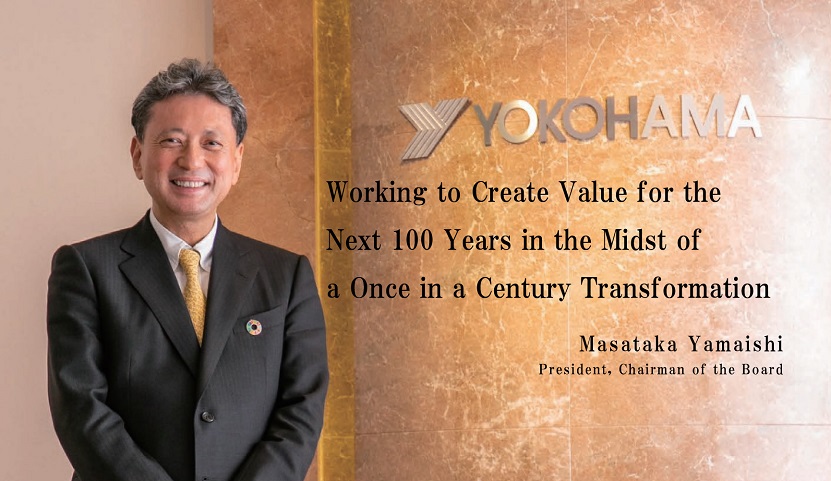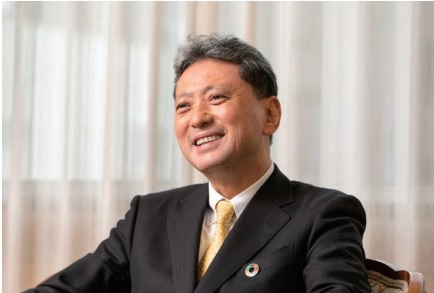Message from the President

Continuous Improvement Based on the Prerequisites of Safety, Quality and Compliance
Due to the impact of the COVID-19 pandemic that began in 2020, the business environment surrounding the Yokohama Group has become very challenging, with a rapid decline in production by automobile manufacturers. Despite these harsh conditions we have maintained a steady hold and have continued making various improvements with regard to safety, quality and compliance.
We have placed a top priority on safety in our business operations, having learned from the fire that occurred at our production facility in the Philippines in 2017, and resolving never to allow any serious accidents again. In order to create a workplace where all employees can work safely and with peace of mind, we are making proactive
investments to encourage risk assessment efforts, and providing thorough education in the workplace, to ensure that every employee stays mindful of safety in their work at all times.
In terms of quality, which is the essential foundation and framework for any manufacturer, we believe that it is important to maintain a stance of remaining ever mindful and never causing inconvenience to our customers based on the philosophy of quality, cost and delivery (QCD).
With regard to compliance, we seek to thoroughly reform an awareness of compliance issues via internal communication that the actions of one individual can have a major impact on the company.
Sustainable management is essential. By continuing to make daily improvements based on the key prerequisites of safety, quality and compliance, Yokohama aims to engage in management with a firm commitment to realizing our targets and results.
Becoming an Organization That Can Achieve Growth and Generate Earnings Even as the Market Changes
Our three-year medium-term management plan, Yokohama Transformation 2023 (YX2023), was announced in March 2021. During the plan, we will target growth into the next generation by pursuing the “Exploitation” of strengths in existing businesses while “Exploration” to create new value in the Midst of a Once in a Century Transformation. It is also an expression of my own words, incorporating 30 years of insights and experience developed at Yokohama Rubber and listening to various opinions. If we consider the global tire market, within a market scale of around ¥20 trillion, the ratio of consumer tires
(such as passenger car tires) to commercial tires (such as tires for trucks, buses and agricultural machinery) is around 1:1. In the future, as trends and developments such as Connected, Autonomous/Automated, Shared, Electric (CASE), Mobility as a Service (MaaS) and Digital Transformation (DX) continue to accelerate, it is expected that the number of privately owned vehicles will decrease and the number of (public) infrastructure vehicles that support the movement of people and goods will increase. Despite these market conditions, the Group’s sales composition ratio in the tire business is biased, with a 2:1 ratio of consumer tires to commercial tires. As the focus of customers shifts from individuals to businesses, and from consumer tires to commercial tires, the Group will advance a strategy based on two key approaches: “Exploitation” of its consumer tires and “Exploration” of commercial tires.
As for consumer tires, we aim to expand our sales ratio of high-value-added tires by focusing on three categories, specifically, ADVAN ultra-high-performance tires, GEOLANDAR for SUVs and pickup trucks and winter tires. By expanding original equipment (OE) use of ADVAN and GEOLANDAR brand tires on new vehicles, strengthening sales in the replacement market and expanding the size lineups of products including winter tires and enhancing sales measures tailored to each region, we will increase the percentage sales volume for these products from the current 40% to 50%, and aim to expand profits.
For commercial tires, we will explore market changes based on the themes of cost, services, DX and expanding product lineups. In particular, we would like to focus on our off-highway tire (OHT) business, which can be expected to generate stable high earnings by increasing food production and logistics and generate profits in this field.
In FY2021, the first year of our YX2023 plan, we achieved record sales and profits due to the fact that we achieved certain results in consumer tires, including OE installation of ADVAN and GEOLANDAR tires on premium cars, passenger cars, for van use and winter tires for trucks and buses, mainly in Japan and Europe. In commercial tires, we signed an agreement to purchase shares in Trelleborg Wheel Systems Holding AB, a Swedish manufacturer of tires for agricultural machinery and industrial vehicles. Through this acquisition, we believe that we have been able to build a network that covers major markets around the world, including North America, Japan (the Group’s key area of strength until now), Asia and now Europe, enabling us to gain a global foothold in the OHT business.
In the Multiple Business (MB) segment, in addition to restructuring through the transfer of the Hamatite business, we made capital investments to triple the production capacity of our plants in China in the hose & couplings business. In the industrial products business, we consolidated our marine hose production bases in Hiratsuka and Indonesia to strengthen and expand our business by focusing our resources.
For consumer tires, we are working continuously to maximize the ratio of high-value-added products in FY2022 by continuing to expand the OE use of our tires on premium cars, supplying ADVAN racing tires for motorsports activities and strengthening sales of the ADVAN brand in general.
For commercial tires, we have been supporting the transportation business with tire management system (TMS) and validating our business model through demonstration tests of our tire air pressure remote access system (TPRS) for passenger cars. We will collect and analyze data obtained through these initiatives as we seek to expand our services going forward. We will also advance the development of sensor tire products and strengthen our service network for customers who require tire services.
In the MB segment, in the hose & couplings business, following on from China, we will invest to increase the production capacity of our Ibaraki Plant and work to reorganize our production system for automotive hose couplings in North America. In the industrial products business, we will seek to maximize our share of the domestic market by investing in increased production of conveyor belts, while at the same time integrating the aerospace products business and industrial products business to accelerate structural reforms.
Through the strategic measures of YX2023, Yokohama is now starting to see the direction of our structure that can expect to achieve growth and earnings even in the face of market changes. What is crucial as a company is to increase sales and profits and to achieve sustainable growth with solid earnings. The tire business is now well
positioned, with the right portfolio to grow more than our competitors. We will also create a system that enables us to cultivate our other businesses, aside from the tire business, through selection and concentration. As a culmination of these efforts, I believe it is my responsibility to put Yokohama on a growth trajectory for the future during the final 18 months leading up to 2023.
Winning Out over Global Competition
In addition to bolstering our business strategy, we are also working on a human resources strategy to strengthen our management base. We will reform our personnel system, expand the ratio of performance-linked remuneration for job-typed managers and appoint talented young human resources to managerial positions at an early stage. In particular, since overseas sales account for 60% of the Group’s overall sales, we believe that it is essential to secure and train management personnel who can carry the Group forward and ensure our survival against global competition. Out of around 33,000 Group employees, currently roughly 100 persons hold the position of department manager. We will first work to develop these human resources as future senior management candidates. In order to enhance our global competitiveness, it is necessary to delegate them business management as regional general managers, as well as have a well-governed organizational structure in which local human resources who are familiar with local languages and culture conduct business operations. We have already appointed local personnel as executive officers at Yokohama Europe, Yokohama Off-Highway Tires (YOHT) in India and in China.
We also plan to integrate our Shimbashi head office and Hiratsuka Factory by March 2023, with the aim of creating a stronger organization that can respond flexibly to major changes in the business environment. In addition to achieving speedier decision-making by unifying our planning, production, sales, technology and logistics bases, we will also continue to advance work style reforms for employees by establishing satellite offices with specific functions such as our sales division in Shinagawa, which will serve as a relay point between the two locations, and expanding remote work/telecommuting and flextime work. Through work styles that are not reliant on place or time, we will work to improve a work-life balance, actualize active participation and facilitate career development for female employees from the childbirth and child-raising generation(s) and seek to eliminate severances due to nursing and childcare commitments and spouse transfers.

Taking Responsibility for the Future through ESG Initiatives
Yokohama Rubber engages in environmental, social and governance (ESG) initiatives under the slogan of “Caring for the Future.” This also means taking responsibility for the future. To achieve sustainable growth, we must create a sound and profitable business model as a basis for working to actualize ESG initiatives. We believe that twopronged management that emphasizes offense and defense is precisely what will lead us to success and what embodies the depth and exploration we are aiming for in YX2023.
It is our mission to steadily implement our current plans with an eye to the future direction of our business and contribute to the resolution of regional and social issues through ESG initiatives. I am confident that we can actualize ESG initiatives by incorporating this philosophy into our work activities and accumulating it as a source of organizational knowledge.
Our overarching mission of Yokohama Rubber—with its 100-year history—is to carry on a company as a company that can continue to thrive and survive for the next 100 years. YX2023 also highlights efforts to create new value with a view to the next 100 years as a key theme, and we will tackle the challenges of creating mechanisms that create value not only for customers but for all of our stakeholders. Our desire is for all of our stakeholders to understand these and other initiatives of the Group, and to look forward to our future growth.


